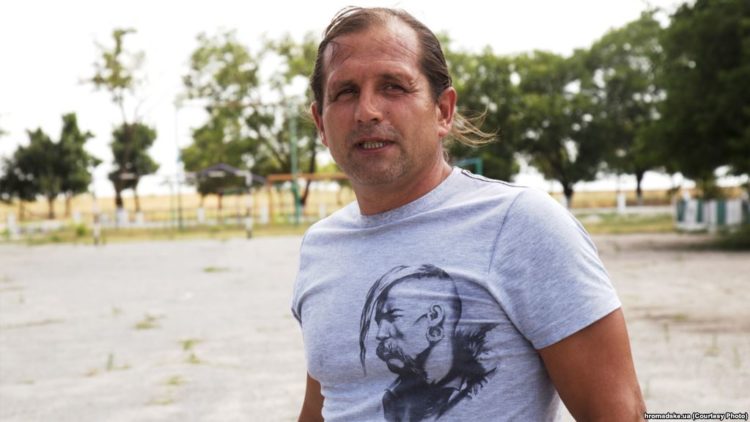That Crimean Tatars are increasingly subjected to this travesty of justice is a result of Russia's occupation of Crimea, after which the repressive policies against Russian Muslims spilled over to the Ukrainian peninsula. Russia portrays its witch hunt for Hizb ut-Tahrir members as a desire to combat radical Islam but, in fact, it is a consequence of Russia's long-standing war on Muslims which, paradoxically, has gone a long way to creating the very problem of Islamic radicalism in the first place.
Euromaidan Press dove into radical Islamic ideologies, Russia's strained relations with Muslims, and the tactics its special services use in the conveyor belt of politically motivated sentences.
On 16 September, seven more Crimean Tatars from the Crimean peninsula which Russia occupied in 2014 were predictably sentenced to monstrous terms by a court in Rostov-on-Don. Marlen Asanov, Memet Belyalov, Timur Ibragimov, Server Mustafayev, Seiran Saliyev, Edem Smailov, and Server Zekiryaev, defendants in what human rights activists termed the "Second Bakhchysarai case," were given from 13 to 19 years in jail on charges of terrorism. Unexpectedly for all, the eighth defendant, Ernes Ametov, was acquitted.

Over 400 supporters made the 700 km journey from Crimea to the building of the military court in Rostov. Pictures of the eight prisoners were on T-shirts of men and billowing scarves of hijab-dressed women.
None of the defendants recognized the charges - they sat in masks bearing the letters "goszakaz" - "state order."
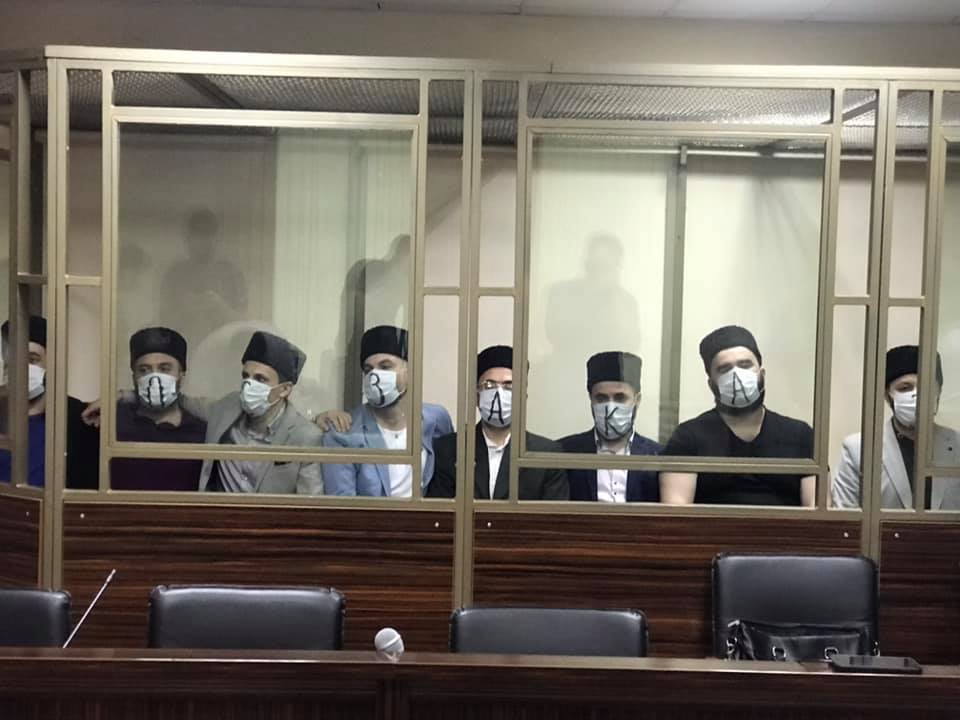
They are on the list of 99 Ukrainian citizens (according to the LetMyPeopleGo initiative) jailed by Russia on political grounds. 69 of them are imputed with the same charges as the seven new inmates: participating in the Islamic organization Hizb ut-Tahrir, which the Russian state equals to terrorism. Like other similar cases, the men were recognized as political prisoners by the reputable Russian human rights center Memorial.
69 of the 99 Ukrainian political prisoners of the Kremlin are accused of Islamic terrorism without any evidene of terrorism. 76 of them are Crimean Tatars. Crimea is an open hunting ground for Russian politial repressions. #LetMyPeopleGo pic.twitter.com/lL2439bwiR
— Let My People Go_En (@LetMyPplGoUA_en) October 1, 2020
Making the case more egregious is the fact that seven of the eight accused are activists of Crimean Solidarity, an organization that sprung up in response to Russia's repressions of Crimean Tatars, an ethnic Muslim minority in Crimea which overwhelmingly stood up against Russian occupation in 2014. By documenting and broadcasting every repressive step of the Russian siloviki and kangaroo courts, and supporting the families of the imprisoned with ruble and prayer, Crimean Solidarity has emerged as a powerful voice of resistance against the persecution of opposing voices in the occupied peninsula.
Making the case more heartbreaking are the 33 children now left without fathers in the traditionally large families.
7 innocent Crimean Tatars sentenced to 110 years. 33 children left w/o fathers.
Marlen Asanov-19 yrs,4 kids Memet Belyalov-18 yrs,1 kid
Timur Ibragimov-17 yrs,4 kids
Server Mustafayev-14 yrs,4 kids
Seiran Saliyev-16 yrs,4 kids
Edem Smailov-13 yrs,3 k
Server Zekiryaev-13 yrs,13k pic.twitter.com/4FfQf6M3CO— Let My People Go_En (@LetMyPplGoUA_en) September 17, 2020
https://platform.twitter.com/widgets.js
Occupied Crimea caught in Russia's campaign against Muslims
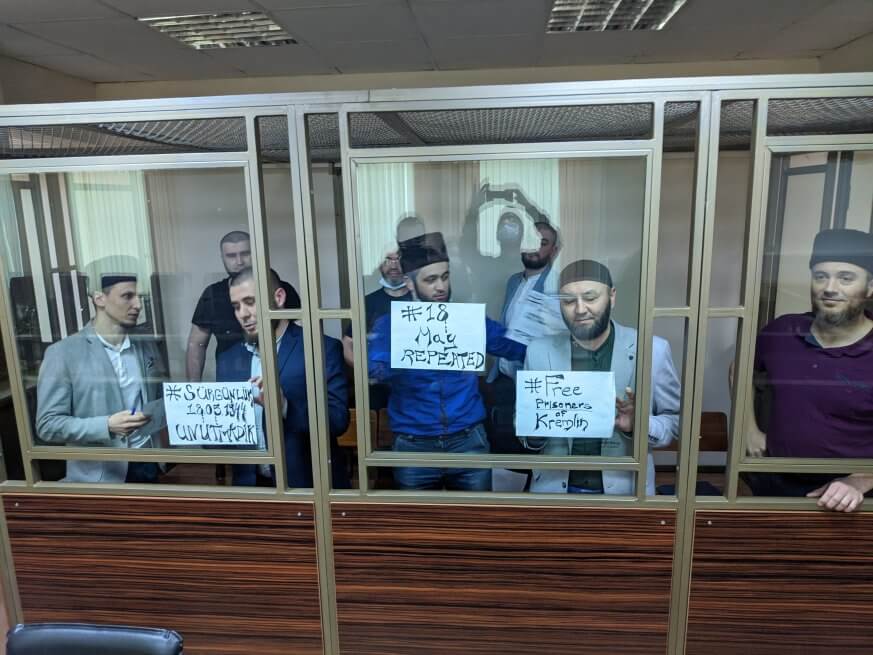
One of the reasons these cases get so little traction in the West is because the defendants are accused of the emotive and confusing crime of Islamic terrorism. The very word elicits conflicted reactions in the democratic world, and Russia exploits this masterfully.
True, Russia has a real problem with Islamic terrorism. However, according to Russian social anthropologist Denis Sokolov, it was mainly precipitated by Russia's own actions, namely - the two wars against the independence-seeking Chechens and a political terror campaign against the religious awakening of the job-seeking migrants from Islamic village regions of the former Soviet Union who flowed en masse into Russian cities. The Islamic faith of these labor migrants gave them a new sense of identity and a way to connect with the past.
This is why in Russia Muslims are divided into the "right" and "wrong" kind and the "wrong" ones are constantly under pressure, Sokolov stresses.
Perceiving these devout "New Muslims" as prone to separatism and radicalism, and therefore a threat to state power, the Russian authorities, with the abetment of the "official imams" wanting to retain their influence, took to intimidating and persecuting their leaders and labeling this growing community of believers as terrorists. The latter was achieved through propaganda, as well as laws labeling certain branches of Islam and their adherents as extremists. This made it easy to repress each and any Muslim activist, should they speak out against corruption, land use abuse, or advocate to practice their religion as they see fit.
Paradoxically, with their actions to suppress and push out the growing community of "New Muslims," as well as a brutal war against Chechens, the Russian authorities polarized the active part of the Islamic community and created the very Islamic terrorist problem they are now fighting at home, as well as leaking mujahedeen, armed Islamic fighters, to Türkiye, Syria, and lands controlled by ISIS.
To this end, the Kremlin propagandists have constructed, according to researcher Denis Sokolov, "a believable narrative of war with the heroic Russian armed forces and special services in a battle against the forces of radical Islam." This narrative secures social support for the Russian security services' hunt for genuine extremists, epitomized by subway bombings and school sieges -- as well as the persecution of any activist vilified as one.
The criminalization of Russia's Islamic dissidents began in 1998 in Dagestan when a law on the prohibition of Wahhabism was adopted. Later, in the 2000s, Islamic political movements that renounce the use of armed jihad to achieve their goals were criminalized: Hizb ut-Tahrir in 2003, following Central Asian republics, and in 2009, Tablighi Jamaat. 2014 saw a renewed crackdown on dissident Muslims:
"Any Muslim who confesses the 'wrong' Islam, according to the law enforcement or official clerics, becomes a target for the special services. These people have drugs, cartridges, grenades planted on them, with arrests following. A huge amount of Muslims was forced out of Russian territory," says Sokolov.
It was against this backdrop that Crimean Muslims found themselves in the crosshairs of the Russian special services:
"All Muslims are pressured in Russia, period. In Tatarstan, in North-West Siberia, Chechnya, Dagestan, Moscow... Crimea 'became' a part of Russia, and the Crimean Muslims received a full package of services from the Russian law enforcement organs... At first, the Crimean Tatars were all demonized in Russian media: they talked about them being not only Muslims but also separatists, that they will conduct terrorist acts. Hizb ut-Tahrir is prohibited in Russia. As far as I know, the same people who conducted the campaign against Hizb ut-Tahrir in Tatarstan and Bashkorstan went to Crimea," Sokolov stresses.
Russia's repressions against non-systemic Muslims led them to consider more radical means of struggling against their tyrannical governments or to flee to countries that are more loyal to Muslims - like Ukraine, where Hizb ut-Tahrir operates legally.
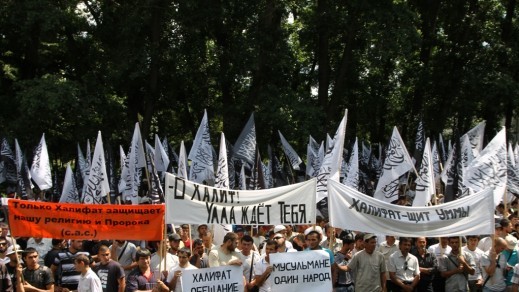
Before Russia's occupation of Crimea, the organization had made inroads with Crimean Tatars and in 2013 even held an international forum in the peninsula. As in Russia, it set itself against the official Islamic leadership -- the Crimean muftiyate -- as well as the national leaders of the Crimean Tatars and its organ, the Mejlis.
At the time, Dzhemilev believed the Russian special services were infiltrating the Hizb ut-Tahrir movement, which he said was "spreading a primitive ideology designed for primitive people," to discredit and divide the Crimean Tatars and thus neutralize the largest opposition to Russia's plans in Crimea. Hizb ut-Tahrir's shunning of nation-states ran sour with the mainstream Crimean Tatar movement's aims for more political representation: in 2013, an open letter of Crimean Tatar organizations warned about the "mortal danger" which Hizb ut-Tahrir poses to the Crimean Tatar people and Islam in general.
Then came Russia's occupation of Crimea, after which many Crimean Tatar Hizb ut-Tahrir members emigrated to mainland Ukraine.
Does banning Hizb ut-Tahrir make sense?

Central to Russia's persecution of Crimean Tatars is the criminalization of the Hizb ut-Tahrir organization, to which they are accused of belonging, as terrorist.
The European Court of Human Rights established that banning the group does not necessarily violate the European Convention, as Hizb ut-Tahrir's goals contravene its values.
Despite being at odds with democracy, Hizb ut-Tahrir has not been linked to any terrorist activity. Nevertheless, Russia is one of two nations in the world to equate membership in the organization with terrorism, the second being Uzbekistan.
In 2003, the Supreme Court of the Russian Federation declared Hizb ut-Tahrir a terrorist organization and banned its operations on Russian territory along with 13 other Islamic organizations. But no credible justification was presented for the decision, says the Russian Memorial Human Rights Center, as there is no evidence of terrorism committed by its members. The ban was followed by the introduction of new offenses of organizing and participating in the activities of a terrorist organization, punishable by 10-24 years in custody, in Russia's Criminal Code in 2013, as a result of which Russian Muslims accused of participating in Hizb ut-Tahrir were given even longer sentences.

The Center considers persons accused only of belonging to Hizb ut-Tahrir political prisoners -- as mere imputed membership in the organization, without proof of any planned or prepared wrongdoing -- is the reason for the harsh sentence; furthermore, Russia violates the Geneva Convention when applying its legislature in the occupied territory of Crimea, where the organization is legal under Ukrainian law.
But even if there are no reasons to criminalize Hizb ut-Tahrir as a terrorist organization, perhaps such steps are necessary to curb Islamic extremism?
It may seem counterintuitive, but it is precisely repressive measures that can lead to more extremism, many experts believe. In 2013, Ihor Semyvolos, the director of the Ukrainian Center of Middle Eastern studies, called on Ukraine to avoid repressions against Ukraine's Hizb ut-Tahrir chapter, so that the "radicals" there would not be pushed to form an extremist or terrorist organization. Meanwhile, Said Ismagilov, Mufti of the Spiritual Administration of Muslims of Ukraine, believes that Ukraine will not face the problem of Islamic radicalism precisely because its "European" tolerance to differing opinions and "adequate" attitude towards Islam, meaning low Islamophobia and the possibilities to preach and freely develop culture.
Forged membership in Hizb ut-Tahrir: a tool for cracking down on activists

Russia is using the pretext of a hunt on Hizb ut-Tahrir in Crimea to prosecute Crimean activists as terrorists, states a report of human rights organizations titled "Fighting terrorism or terrorizing activism?" released after Russia's largest-ever 2019 raid on the homes of Crimean Tatars, after which 24, most of them also activists of Crimean Solidarity, were arrested. They are currently being prosecuted on the same Hizb ut-Tahrir accusations, with the main proof being copies of identical Hizb ut-Tahrir literature planted by the security forces during the search.
"These individuals are being targeted in order to dismantle ‘Crimean Solidarity,’ as part of a wider effort to suppress actual or perceived Crimean Tatar opposition to the Russian occupation of the Crimean Peninsula... the spectre of terrorism is being raised to isolate the Crimean Tatar community and galvanise non-Muslim support for the authorities’ repressions," the report's authors allege.
The recent Second Bakhchysarai case is a vivid example of how the Russian court system fabricated evidence to incriminate Crimean Tatars with terrorism and sentenced them to up to two decades in jail. A detailed account of the case by the Ukrainian media graty.me allows reviewing the details.
Scandalous experts and "secret witnesses"
According to the prosecution, the accused were members of a Hizb ut-Tahrir created and led by Marlen Asanov, Timur Ibragimov, and Memet Belyalov. The case was led by FSB operative Nikolai Artykbaev, a turncoat of the Ukrainian Security Service who defected after the occupation. He organized a recording of conversations during three gatherings inside a mosque in Bakchysarai, which became the basis of the accusation of the eight Crimean Tatars of the Second Bakhchysarai case. Artykbaev personally transcribed the recordings, but made plenty of mistakes, not knowing Arabic.
The "secret witnesses"

Konstantin Tumarevich, a Latvian citizen who migrated to Crimea and adopted Islam, made the recording. As well, he was presented as "secret witness Ivanov" by the prosecution but was easily identified by the accused; he was also a "secret witness" in a previous similar case against Crimean Tatars accused of Hizb ut-Tahrir membership. The side of the defense maintains that Tumarevich collaborates with the Russian FSB; one of the eight accused men, Asanov, said that he has problems with the law and is illegally on Russian territory.
Despite the attempts to preserve his secrecy, a second "secret witness Bekirov" was recognized as well as Uzbek citizen Salohiddin Nazrullaev. During the court sessions, the accused said that Nazrullaev faced financial difficulties and had citizenship-related problems, that two of the eight accused, Asanov and Smailov, attempted to help him solve them, and that he was forced to testify on the side of the accusation under the threat of having his child taken away.
During the questioning in court, the secret witnesses sat in another room with their voices altered to the extent of being unintelligible, made many pauses during which third-party noises were heard, contradicted themselves, made fantastic claims such as that some people from the Middle East transferred hundreds of thousands of dollars for the needs of Hizb ut-Tahrir in Crimea, failed to clarify inconsistencies, and "forgot" most of the supposedly incriminating details.
Crucially, they failed to provide convincing evidence of any Hizb ut-Tahrir connections of the eight Crimean Tatars, or any evidence of terrorism.

- Did I call on you to join Hizb ut-Tahrir?
- I don't remember.
- Did I give you Hizb ut-Tahrir literature?
- I don't remember.
- And the rest of the defendants, who specifically called on you, who didn't?
- Yes, Marlen Asanov, Server Zekiryaev.
- Did I call for the seizure of power?
- I don't remember.
- Did I call you to take hostages? - but the court for some reason removes the question.
- Have I called on you to kill people in power?
- I don't remember.
- Did you study military science at the meetings?
- I don't remember.
- Did I call you to intolerance towards other nationalities?
- I don't remember.
- And intolerance towards people of other confessions?
- I don't remember."
According to lawyer Emil Kurbedinov, this is not the first time secret witnesses are used to fabricate evidence in Hizb ut-Tahrir cases: despite the court's measures to prevent their identities from being revealed, the accused often recognize them.
"Often, they are people who are dependent on the FSB, or who are in Crimea illegally. Based on the previous cases, we are sure that these are people dependent on the special services. Or simply FSB operatives -- anyway, the truth is not being considered at all."
The dubious experts
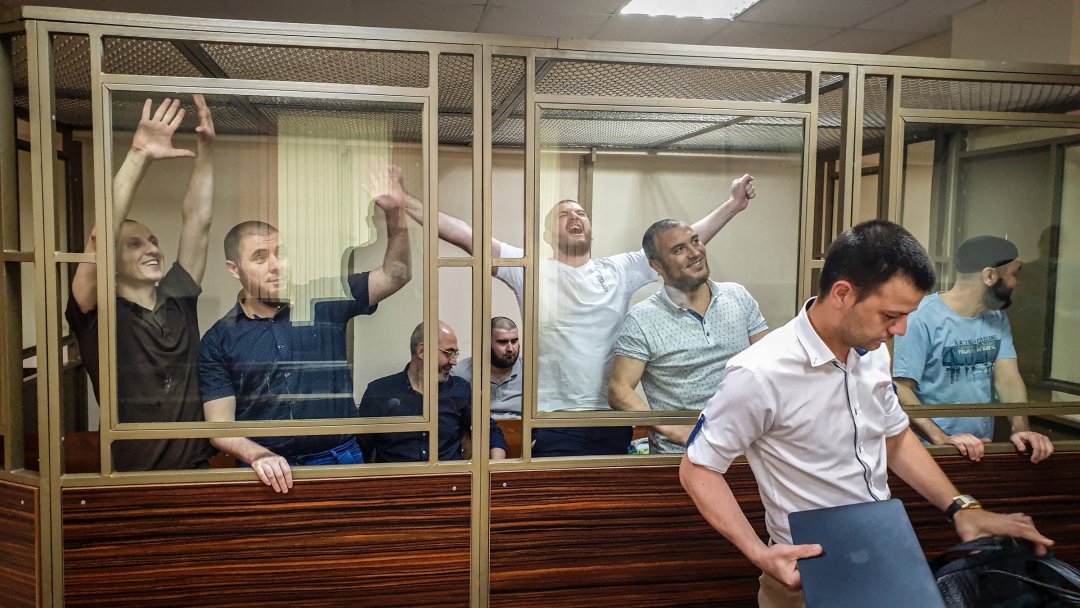
Since the FSB operative Artykbaev did not know Arabic well, he made dozens of mistakes in the transcript of the conversations in the mosque, the accused stated. As noted by graty.me editor Anton Naumliuk, the recordings were conducted with no legal norms, meaning that there was no basis to start a pre-trial investigation at all.
The transcripts were analyzed by experts from the Center of Linguistic Expertise of the Ufa Pedagogical University who concluded that the participants belong to Hizb ut-Tahrir. However, the experts had only a faint understanding of Islam, and, therefore, no expertise to make such a conclusion, stated independent expert Yelena Novozhilova, who was an expert in previous Hizb ut-Tahrir cases and prepared an analysis of the assessment of this center.
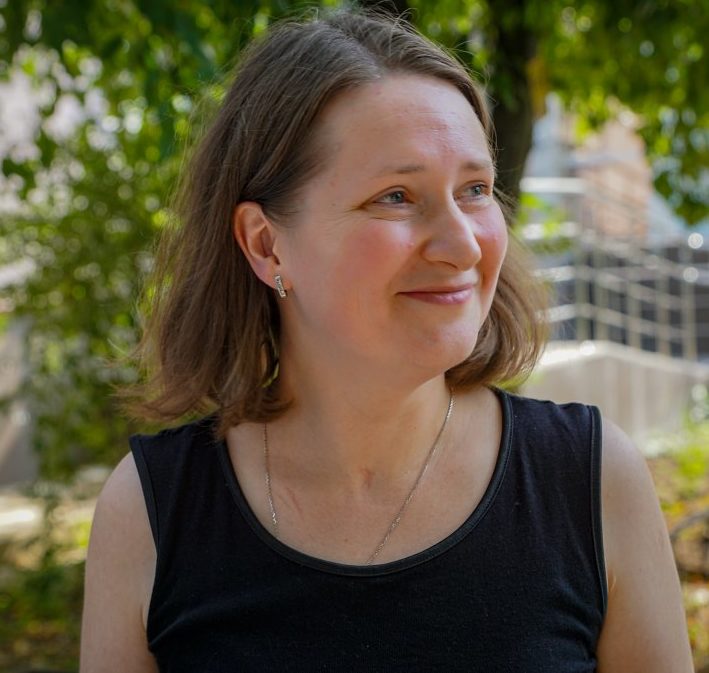
Novozilova concludes that the expert linguists of this center, Yulia Fomina and Yelena Khazimulina, are not competent to establish whether the persons heard on the recordings could belong to Hizb ut-Tahrir because they generally do not understand the difference between Islam and Hizb ut-Tahrir ideology.
Religious expert Timur Urazmetov isn't competent to establish this, either.
Furthermore, the expert assessment carries the stamp of the wrong institution, which further undermines its integrity.
In the words of lawyer Aleksei Ladin, the experts determined the accused as Hizb ut-Tahrir members beforehand and stretch the conclusions in their text to fit that decision instead of establishing the facts. The experts also go beyond the object of investigation and make conclusions about the non-verbal gestures which are impossible to see on an audio recording. There were no calls to an armed uprising in the words of the accused. A multitude of violations of the methods of the experts do not allow replicating their assessment - like replacing the speech of the accused with the conclusions of the experts, logical and factual mistakes.
Crucially, contrary to the conclusions of the experts, the recordings do not contain any animosity towards other nationalities or religions. Neither do they mention Hizb ut-Tahrir.
This is the only episode where a distinct negative assessment of other persons is heard, Novozhilova writes:
"So once we went to Rostov. And we met this guy. They swear really bad there, these locals, well, the non-Muslims. They swear! They have more profanities than normal words. They tie together these profanities with the normal words."
Other topics in the discussion concerned who Muslims should be respectful of (everyone who does not actively harm Islam), that many Crimean Tatars do not yet know the basics of the Islamic faith and must be educated, and that Tatars should not look for flaws among other nationalities.
Novozhilova was questioned in the court as well; when asked whether those heard conversing could have acquired new knowledge, she answered:
"In the course of this conversation, I believe, people got the idea of the concept of love in Islam."
What is left of the accusation?
They did not commit any of the acts mentioned in Russia's own law "On Combating Terrorism."
From the testimony of FSB operative Artykbaev, it follows that the accused could have potentially committed something terroristic or Caliphatic, but in the future, and this needed to the thwarted.
The case of the accusation rests on "secret witnesses" who are likely dependent on the FSB and could not name anything that the accused did that pertained to terrorism. As well, it used a deeply flawed linguistic source, in which experts with no relevant expertise found what the accusation required of them.
Seven innocent men are sentenced to 13-19 years in prison for practicing their religion. Russia's conveyor belt of repressions against Muslims continues, unnoticed by the world.





